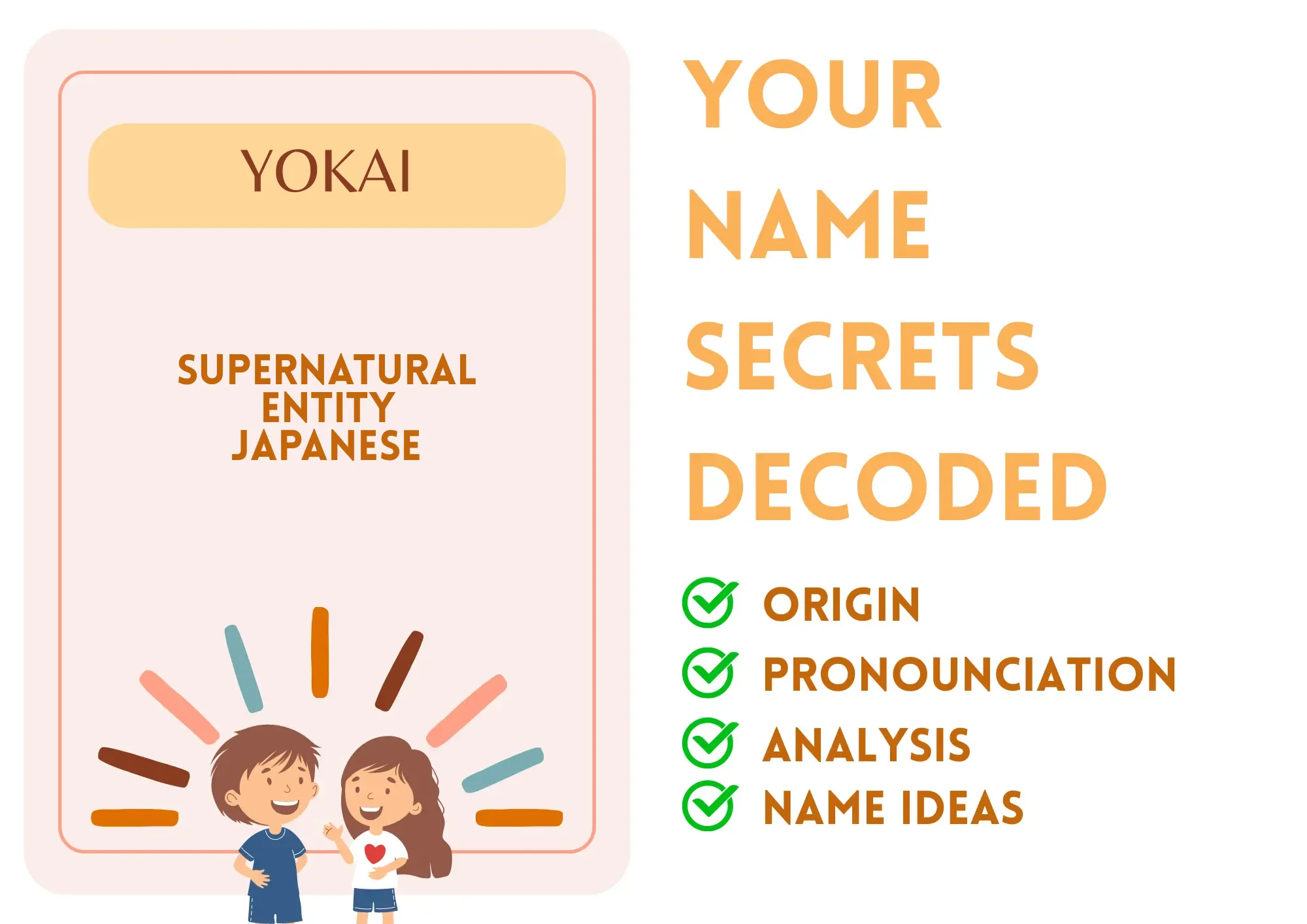
Yokai
Yokai is a fascinating and culturally significant name originating from Japanese folklore, denoting a class of supernatural entities or spirits. In Japan, yokai encompass a variety of beings, from mischievous and playful spirits to more malevolent entities. The term evokes curiosity and intrigue, making it a unique choice for a child.
Yokai is predominantly a unisex name, often reflecting a connection to Japanese culture and tradition. The name holds spiritual significance, as yokai are integral to many folk tales and represent the intersection of the natural and supernatural worlds in Japanese belief systems.
In popular culture, yokai have been featured in various media, including anime, movies, and literature, notably in titles such as 'Yo-kai Watch' and 'Natsume's Book of Friends'. People generally perceive the name as whimsical and imaginative, promoting a sense of wonder about the world.
Basic Information
Gender: Unisex
Sounds Like: yo-KAI
Pronunciation Explanation: The emphasis is on the second syllable 'KAI', pronounced like 'sky', and the first syllable 'yo' is pronounced like 'yo' in 'yogurt'.
Summary and Meaning
Meaning: supernatural entity (Japanese)
Origin: Yokai has its roots in Japanese folklore, where it represents various supernatural beings that embody different traits and characteristics.
Usage: Yokai is a unisex name, suitable for any gender, and reflects a playful nature.
Name Number (Chaldean)
Name Number (Pythagorean)
Popularity (Global Rank)
Overall: 397385
Boys: 72681
Girls:
Most Popular in
Religious and Cultural Significance
Religion: Shinto
Background: In Shinto belief, yokai are considered forces of nature and are often associated with animistic traditions, highlighting the spiritual connection between humans and the natural world.
Cultural Significance: Yokai play a vital role in Japanese culture and storytelling, often used to convey moral lessons or to explain the mysteries of nature and the world around.
Historical Significance: Yokai have been part of Japanese tradition for centuries, featuring in ancient texts and folklore, shaping the country's cultural narrative through storytelling and festivals.
Popular Culture
Literature and Mythology: Yokai are frequently depicted in Japanese folklore, often as characters in tales that teach moral lessons or convey historical nuances.
Movies and Television: The concept of yokai has influenced various anime and movies, such as 'Yo-kai Watch', 'Natsume's Book of Friends', and 'Spirited Away', bringing these supernatural beings into modern storytelling.
Feelings and Perceptions
Perception: The name Yokai is perceived as whimsical and imaginative, evoking curiosity and an appreciation for folklore and mythology. It carries a sense of mystery and playfulness.
Positive Feelings: Unique, mythical, playful, imaginative, culturally rich.
Negative Feelings: Might be seen as unconventional or unfamiliar in some cultures, potentially leading to mispronunciations or misunderstanding.
Practical Considerations
Ease of Writing and Calling: Yokai is relatively easy to write and pronounce, with five letters and two syllables. However, its cultural specificity may require explanation to those unfamiliar with the term.
Common Typos and Misspellings: Yokie,Yokey,Yokaii,Yoky
Common Nicknames: Yoki,Kai,Yo
Yokai Popularity
Yokai Usage and Popularity By Country
| Country | Rank (Overall) |
|---|---|
| Belarus | 3146 |
| Morocco | 29971 |
| Chile | 34158 |
| Spain | 63520 |
| Philippines | 100268 |
| Australia | 105589 |
| South Africa | 120008 |
| United Kingdom | 182431 |
| United States | 216664 |
Yokai Usage and Popularity By City
| City | Rank (Overall) |
|---|
Compatibility Analysis
Famous Persons Named Yokai
No results found for Yokai.
Related Names
Similar Sounding Names:
Yuki,Kai,Yoha,Yoko
Similar Meaning and Related Names:
Kami ♀️
Sibling Name Ideas (Brothers):
Kaito ♂️
Ren ♀️
Buddhist, Shinto (Japanese), Confucian (Korean)